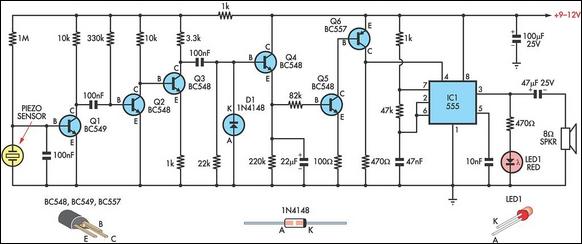Home » Circuits
Simple Knock Alarm With Piezo Sensor
This circuit uses a thin piezoelectric sensor to sense the vibrations generated by knocking on a surface; eg, a door or table. Basically, it amplifies and processes the signal from the sensor and sounds an alarm for a preset period. In operation, the piezoelectric sensor converts mechanical vibration into an electrical signal. This sensor can be attached to a door, a cash box, cupboard, etc using adhesive. A 1-1.5m long shielded cable can then be connected between the sensor plate and the input of the circuit. The signal generated by the sensor is amplified by transistors Q1-Q3 which are wired as common-emitter amplifiers.Circuit diagram:
The signal is then rectified by diode D1 and amplified by transistors Q4-Q6. As shown, the output from Q6's collector is fed to pin 4 (reset) of 555 timer IC1. This is wired as an astable multivibrator. Each time Q6 turns on, its collector goes high and IC1 activates and produces an alarm tone in the speaker. The alarm automatically turns off 10s after knocking ceases - ie, the time taken for the 22µF capacitor on Q4's emitter to discharge. Finally, note that it may be necessary to adjust the 470O resistor in Q6's collector circuit to ensure that IC1 remains off in the absence of any perceptible knock. A value somewhere between 220O and 680O should be suitable.
Author: Raj. K. Gorkhali - Copyright: Silicon Chip Electronics

